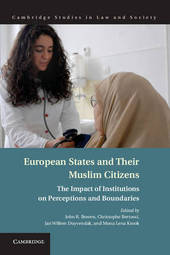
|
European States and their Muslim Citizens: The Impact of Institutions on Perceptions and Boundaries
Hardback
Main Details
| Title |
European States and their Muslim Citizens: The Impact of Institutions on Perceptions and Boundaries
|
| Authors and Contributors |
Edited by John R. Bowen
|
|
Edited by Christophe Bertossi
|
|
Edited by Jan Willem Duyvendak
|
|
Edited by Mona Lena Krook
|
| Series | Cambridge Studies in Law and Society |
|---|
| Physical Properties |
| Format:Hardback | | Pages:302 | | Dimensions(mm): Height 229,Width 152 |
|
| ISBN/Barcode |
9781107038646
|
| Classifications | Dewey:305.697094 |
|---|
| Audience | | Professional & Vocational | |
|---|
|
Publishing Details |
| Publisher |
Cambridge University Press
|
| Imprint |
Cambridge University Press
|
| Publication Date |
7 October 2013 |
| Publication Country |
United Kingdom
|
Description
This book responds to the often loud debates about the place of Muslims in Western Europe by proposing an analysis based in institutions, including schools, courts, hospitals, the military, electoral politics, the labor market, and civic education courses. The contributors consider the way people draw on practical schemas regarding others in their midst who are often categorized as Muslims. Chapters based on fieldwork and policy analysis across several countries examine how people interact in their everyday work lives, where they construct moral boundaries, and how they formulate policies concerning tolerable diversity, immigration, discrimination, and political representation. Rather than assuming that each country has its own national ideology that explains such interactions, contributors trace diverse pathways along which institutions complicate or disrupt allegedly consistent national ideologies. These studies shed light on how Muslims encounter particular faces and facets of the state as they go about their lives, seeking help and legitimacy as new citizens of a fast-changing Europe.
Author Biography
John R. Bowen is Dunbar-Van Cleve Professor in Arts and Sciences at Washington University in St Louis, and recurrent Visiting Professor at the London School of Economics and Political Science. He has been studying Islam and society in Indonesia since the late 1970s, and since 2001 has worked in France, England and North America on problems of pluralism, law and religion, in particular on contemporary efforts to rethink Islamic norms and civil law. His most recent books are A New Anthropology of Islam (2012) and Blaming Islam (2012). Christophe Bertossi is Director of the Centre for Migrations and Citizenship at the French Institute for International Relations in Paris. He was a Marie Curie Research Fellow at the Centre for Research in Ethnic Relations, University of Warwick (2001-3) and a visiting fellow at New York University (2009) and the Institute for Advanced Studies-Collegium in Lyon (2010). His most recent publication is As Cruzadas da Integracao na Europa (2012). Jan Willem Duyvendak has been Professor of Sociology at the University of Amsterdam since 2003. His main fields of research currently are belonging, urban sociology, 'feeling at home' and nativism. His latest books include The Politics of Home: Nostalgia and Belonging in Western Europe and the United States (2011) and Crafting Citizenship: Understanding Tensions in a Multi-Ethnic Society (2013, with Menno Hurenkamp and Evelien Tonkens). Recently, Duyvendak was Distinguished Visiting Fellow at the Advanced Research Collaborative of the Graduate Center of the City University of New York (CUNY). Mona Lena Krook is Associate Professor of Political Science at Rutgers University. Her research analyzes electoral gender quotas in cross-national perspective. Her first book, Quotas for Women in Politics: Gender and Candidate Selection Reform Worldwide (2009), received the American Political Science Association Victoria Schuck Award for the Best Book on Women and Politics in 2010. She is co-editor of Women, Gender, and Politics: A Reader (2010, with Sarah Childs); Gender, Politics, and Institutions: Towards a Feminist Institutionalism (2011, with Fiona Mackay); and The Impact of Gender Quotas (2012, with Susan Franceschet and Jennifer M. Piscopo).
Reviews'This strikingly original volume takes debates about Muslims in Europe into new and exciting territory. It replaces simplistic models of national integration with a more subtle analysis of the intersection between national ideologies and the practical schemas for dealing with Muslims in many different institutions. Each chapter is a model of ethnographic rigour, insight and irony. The result is an ambitious, sophisticated and exceptionally well-crafted volume that deserves to be taken seriously by all researchers and policy makers concerned with Europe's Muslims.' James A. Beckford, University of Warwick 'Connecting practical schemas, institutions, and boundary work, the chapters assembled here represent a real advance in our understanding of Muslims in Europe. The authors convincingly show how civic education courses, the army, hospitals, labor markets, and the judicial sphere are contexts where moral boundaries articulated around sex, gender and religion emerge and where institutional logics clash. Thus the case studies go beyond national models to reveal competing logics across institutional and countries. Theoretically, this remarkable collective effort raises new and provocative questions for institutionalist and cultural analysts across the social sciences. Substantively, it contributes mightily to our understanding of the future of diversity and multiculturalism in Europe, a topic of ever-growing urgency.' Michele Lamont, Robert I. Goldman Professor of European Studies and Professor of Sociology and African and African-American Studies, Harvard University
|